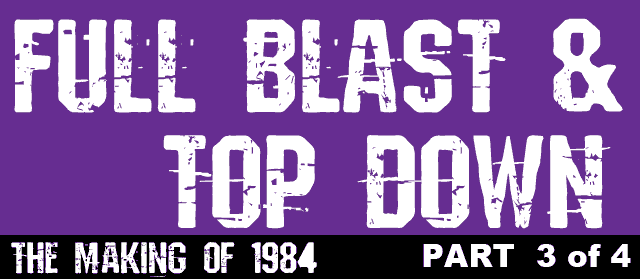
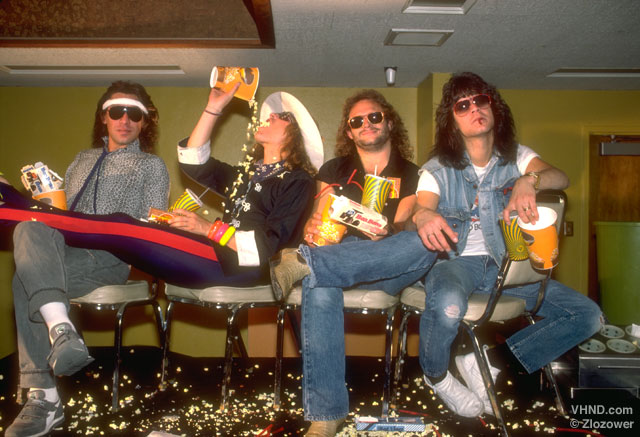

Continued from Part 1 & Part 2
Opening with the unexpected sound of a warm electronic swell, MCMLXXXIV/1984, seemed to herald the arrival of some new mutant, synth-driven, Van Halen. But the truth was that the synths had taken outings on the previous two Van Halen albums, as well, and would likely have featured more had Eddie gotten his way earlier. The short instrumental “1984” and “Jump” follow in the footsteps of that weird time-fuck drone, “Sunday Afternoon in the Park”, from 1981’s Fair Warning, one of two “synth” tunes on that album, and was followed by another two on the next year’s Diver Down, featuring both Eddie (“Dancing in the Street”) and David Lee Roth (“Intruder”) on synthesizer.
The surprise on MCMLXXXIV/1984 was it seemed to underline the fact that the synths were here to stay, especially after the global success of Jump propelled the album to sales of eight million units in the first 10 months of release, thereby seeming to vindicate Eddie’s ideas about what was good for the band.
The other synth tune—”I’ll Wait”—with its low and rather nasty sounding bass notes, had a feel not a million miles from Madonna’s Like A Virgin (a record produced by Roth’s mate, Nile Rodgers, and released a year later). But as with Jump, it didn’t generate much enthusiasm amongst the band. “Donn and I felt very strongly about it,” Eddie told Steve Rosen. “No one else did, so we put it down ourselves. They [the band and Ted] heard it again and said, Uh, what’s that?”
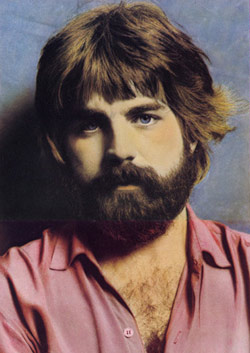
With the instrumental track in place, Roth still couldn’t find inspiration for a lyric. With a mid-September deadline for mixing the finished tracks looming, Templeman called in ex-Doobie Brothers singer Michael McDonald to help rescue the song. “The track was cut and they were kind of stymied on the lyric” he recalls. “I got together with David in Ted’s office, and I had put some ideas down. I went over them with him and he seemed to like them. He may have made some changes at that point, I’m not sure.” It turned out to be a good day’s work for McDonald, as “I’ll Wait” would be one of four US hits culled from the album, which by that time was on its way to becoming one of the biggest-selling albums of the 1980s. “It’s probably one of the more lucrative things I have ever done in my entire career,” McDonald said. “As the Doobies, we did great with records. We had platinum records, but Van Halen was the inception of mega-platinum record sales.”

More naturally Rothian in flavour, however, were the likes of “Hot for Teacher”, “Panama” and “Drop Dead Legs”. A little known fact about Van Halen is that they (along with Devo and Cheap Trick) had originally been under consideration for the starring roles in Allan Arkush’s 1979 movie musical, Rock’n’roll High School (which ended up starring The Ramones). But on the delinquent outing that is “Hot for Teacher”, they seem to make up for that missed opportunity. This is a tune on which the band truly swings—with Roth ‘exuberating’ to the max—over some bumpy territory that has previously been visited on tunes such as ZZ Top’s La Grange, which itself had retraced a path that John Lee Hooker had cut some time earlier. Here, though, the tempo is ramped up to such a degree that it produces, as Eddie said, “a boogie beyond anything” he’d ever heard. It is excessive. But, in truth, any showing off found here merely complement’s Roth’s genius, dumb-ass, lyrical imagery, which trades brilliantly on the experience of childhood as a time of unfair and daily incarceration (“Whaddya think the teacher’s gonna look like this year?”; “I hope you missed us—we’re back!”; “I don’t feel tardy”; “I brought my PENCIL!”).
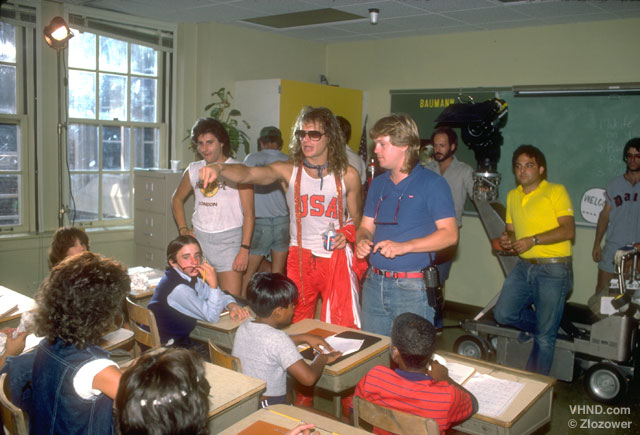
It was something that the band played up to in the amusing video for the song, in which the band alternate between classroom scenes and segments where they take on the appearance of a Temptations-style vocal group, with matching suits and (badly co-ordinated) dance routines. At one point Dave can be seen in front of a cage containing the incarcerated Van Halens and Mike Anthony. In his arms he cradles an oversized hourglass—clock-time being the curse of childhood—as he deadpans, “Awww, man, I think the clock is slow”. In the cage behind him, a bad teacher looking like Jungle Jane beats back the guys with a whip.
We can forgive Dave for projecting such juvenile fantasies, not only because they are a celebration of something that is eternally the stuff of rock’n’roll, but because as he once said, he was—temperamentally, at least—approximately thirteen years old throughout his career fronting Van Halen. “When you’re thirteen you have no responsibility, you don’t think about fixing a certain note, you don’t fear what the critics say, you don’t have a whole coterie of people warning you off it. What makes the tone in my voice is that spirit.”

With the band often working late into the night at 5150 a few songs naturally emerged from grooves that Eddie and Alex were just unable to let go of. With the studio doors open, the sound of Eddie and Alex would waft over nearby homes in the Hollywood hills. Eventually, it became too much for Eddie’s neighbour, Lindsay Wagner – the one-time Bionic Woman of seventies TV fame – who would call Eddie’s wife to ask for the studio doors to be shut. Within a couple of years, Eddie would have to buy her out of her property just to get round the complaints. On one night the tune they were jamming would begin to take shape as “Drop Dead Legs”, possibly one of Eddie Van Halen’s greatest guitar grooves.
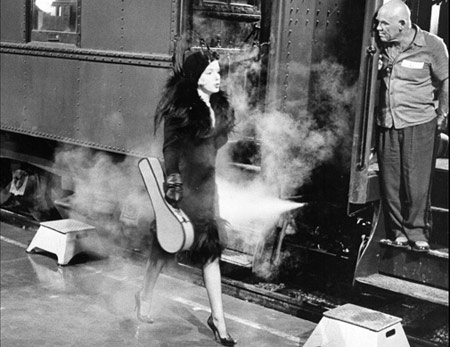
As Dave Roth yelps, “Dig that steam / Giant butt”, he takes his cue from the sight of Marilyn Monroe in Billy Wilder’s 1959 movie, Some Like it Hot, as she shimmies past an overheating train, which is blowing off steam. “I wish I could have been the violin case Marilyn Monroe was carrying in Some Like It Hot,” he told SPIN later, apropos of the movies he’d wished he was in. “In the scene where she’s walking along the side of the train, with all the smoke and the steam coming out, and the way she looked.”
Like Marilyn in motion, this is a tune that sways and shakes and generates heat, and Eddie, on guitar, is the one on the beat and driving it all. First there’s one guitar, thick and fat. It is brown, as Eddie would say. And it moves the whole thing along on its back, like a drunken man taking up the entire spread of the sidewalk as he staggers forth with a friend on piggyback. After a few verses and a chorus section, there comes a lull. Then Eddie seems to sound a bugle call (at 1:26 to 1:33), as if calling out to Alex to get up with the beat. Roth, all the time fixating on that image of Marilyn, sings: “I get a nut-nut-nuthin but the SHAAAYKS over you.”
The three or possibly four guitars here sound and complement each other more like the pieces in a sax ensemble than the sawing and riffing guitars of a rock’n’roll band. That may sound an odd thing to say, but before he ever picked up a guitar Eddie wanted to play sax (just like his father), and even as late as 1985 was still saying he intended to take it up. Eddie first blows low, like a baritone sax, then higher in the register of soprano or clarinet, imaginary valves opening and closing as his fingers get the feel for the tone. Below it all, though, is a cool vamp that seems to temper the heat of Eddie’s lead.

This “brown” tone quality (warm, sweet, anything but sharp and metallic) also characterizes “Panama”, a song that, in its automotive lyrical imagery, seems to be very much of its place, Los Angeles—the city of the freeway. In fact, driving metaphorically went straight to the heart of the Diamond Dave philosophy of living in the moment. “I seem to have my best moments when I don’t consider the creative process,” he told Peter Goddard. “As Bruce [Springsteen] says, just sort of roll down the window and let the wind blow back your hair. You just put the top down and the hair will style itself, you know?”

In “Panama” we can imagine Roth as the driver of a modest saloon—like the Opel Kadett he would drive from Pasadena to Hollywood in the early days of the band. But he’s a man in disguise, keeps his mojo in the glove compartment, so to speak, and when the moment is right, he can magically transform this clunker into the coolest car on the road—wiping out other pretenders—by intoning the abracadabra word, “Panama”. But, the sexual metaphors are playful, as our hero—on spying a lone female driving past—intones the magic word, “Panama”, which enacts the transformation of his clunky car into the machine that will direct the object of his desire onto an on-ramp that leads into his bedroom, and out of reach of the losers who were too slow to get the girl. And it is in the bedroom, with “pistons poppin”, that the song (and the action, one assumes) reaches a climax.
Written by John Scanlan (Author of Van Halen: Exuberant California, Zen Rock’n’Roll)
End of Part 3. Stay tuned for Part 4, coming soon!